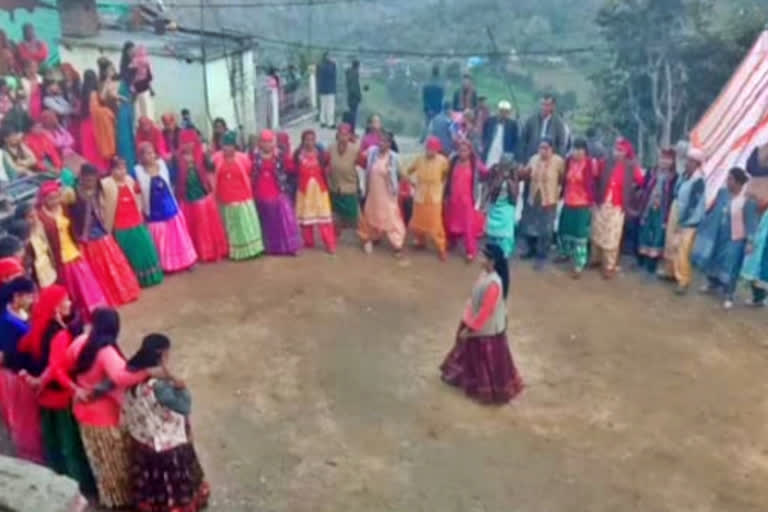Sirmaur: The Hati community in Himachal Pradesh's Sirmaur district is upholding a unique age-old tradition of performing the wedding rituals at the groom's house. Under this Jajra tradition, followed by tribals, it is the bride who takes a 'baraat' to the groom's house where the wedding rituals are performed. This is contrary to the usual practice of the groom visiting the bride's house in most cultures.
Suman Joshi hailing from Chakrata in Uttarakhand was one such bride who came to the house of her groom, Rajendra Pandey, of Kusenu village of Shillai sub-division of the Siramaur district as part of the Jajra wedding ritual. Suman, dressed as a bride, reached Rajendra's house with 100 baraatis (people in marriage procession) along with her family members.
The groom's father Kumbhram said that in Jajra tradition, the groom does not take the procession to the bride's house. In the marriage done under this practice, there was a ban on consumption of drugs and alcohol, he said. The Jajra tradition is unique in many other ways too. All the expenses are borne by the family of the groom.
Also read: Chandrapur lady tutor travels 20 km daily to teach tribal students, wins accolades, support
Besides, dowry is strictly prohibited under the practice. At the wedding, the women of the village make rotis while the men of the village knead the dough. Apart from this, the work from cutting vegetables to making dishes is done by men only. A separate party is later arranged for the men who cook the food on the wedding day.
A dancing ceremony is also held on the occasion. After the marriage ceremony is over, the bride's side takes 5 to 7 important people of the village or family along with the groom to their house. After two days of hospitality, the bride returns to her in-laws' house with the groom. Central Hati Committee's vice-president and advocate Surendra Singh Thakur said that the Jajra tradition has been going on since ages.
He however said that the ritual is on a decline. Kundan Singh Shastri, general secretary of the Central Hati Committee, said that the Jajra practice is a tradition of the tribal area of Giripar, which has also been written in the ethnographic report of the Hati community. The folk culture, tradition, lifestyle of Jaunsar-Bawar of Uttarakhand and Giripar of Sirmaur are similar. People's dialect, dress, traditions, lifestyle, food and customs are almost the same.



